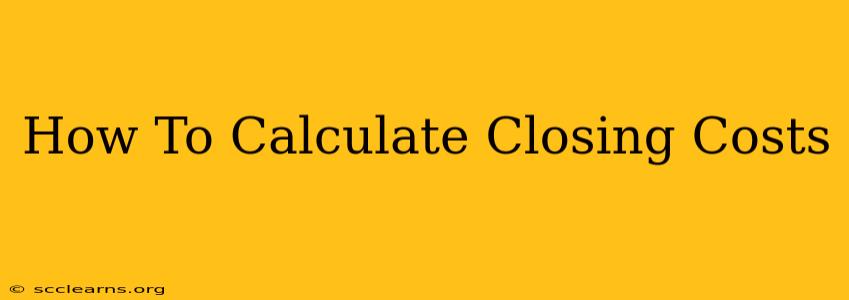Buying a home is a significant financial undertaking, and understanding closing costs is crucial for budgeting effectively. Closing costs represent the various fees and expenses associated with finalizing a real estate transaction. This comprehensive guide will walk you through calculating these costs, helping you avoid unexpected surprises and stay on top of your finances.
What are Closing Costs?
Closing costs are the various fees paid at the closing of a real estate transaction. These costs are typically paid by the buyer, though some may be negotiated with the seller. They cover a range of services and processes, including:
- Loan origination fees: Charges by the lender for processing your mortgage application.
- Appraisal fees: The cost of having a professional appraiser assess the property's value.
- Title insurance: Protects you and the lender against potential title defects.
- Homeowners insurance: Annual premium for your homeowners insurance policy.
- Property taxes: Prorated portion of property taxes for the remainder of the year.
- Recording fees: Government fees for recording the deed transfer.
- Survey fees: Cost of a property survey (if required).
- Escrow fees: Fees charged by the escrow company for managing the closing process.
How to Calculate Your Closing Costs
Calculating your closing costs requires careful attention to detail and access to the necessary information. Here's a step-by-step approach:
1. Obtain a Loan Estimate (LE) from your Lender
Your lender is legally required to provide you with a Loan Estimate within three business days of receiving your mortgage application. This document provides a detailed breakdown of your estimated closing costs. Remember: This is an estimate, and the actual costs may vary slightly.
2. Review Your Closing Disclosure (CD)
Three business days before closing, you'll receive a Closing Disclosure. This document provides a final, detailed accounting of all closing costs. Carefully compare this to your Loan Estimate to identify any significant discrepancies.
3. Gather Information on Other Fees
The Loan Estimate and Closing Disclosure may not include all costs. You'll need to proactively gather information about other potential expenses, such as:
- Prepaid interest: Interest paid on your mortgage from the closing date to the end of the month.
- Homeowners association (HOA) fees: If applicable, these fees cover the maintenance of community amenities.
- Pest inspection: The cost of a professional pest inspection.
- Attorney fees: If you're using a real estate attorney.
4. Calculate the Total
Once you have all the individual cost estimates, simply add them together to arrive at your total closing cost estimate. Don't forget to factor in any potential discrepancies or additional fees that may arise.
Budgeting for Closing Costs
Closing costs can significantly impact your budget. Plan carefully and consider:
- Saving in advance: Start saving for closing costs well in advance of your home purchase.
- Negotiating with the seller: In some cases, you can negotiate with the seller to cover a portion of your closing costs.
- Exploring different lenders: Compare closing costs offered by multiple lenders to find the most favorable option.
Understanding the Components: A Deeper Dive
Let's delve a little deeper into some key closing cost components:
Title Insurance: This protects you against potential title defects, such as liens or ownership disputes. The cost varies depending on the property's value.
Property Taxes: These are usually prorated, meaning you pay only for the portion of the year you'll own the property. Your closing disclosure will clearly outline this calculation.
Loan Origination Fee: This compensates the lender for processing your mortgage application and underwriting your loan. It's typically a percentage of the loan amount.
By understanding these components and following the steps outlined above, you'll be well-prepared to calculate and budget for your closing costs, making your home-buying experience smoother and less stressful. Remember, accurate information is key to financial peace of mind!

